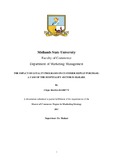Please use this identifier to cite or link to this item:
https://cris.library.msu.ac.zw//handle/11408/3183Full metadata record
| DC Field | Value | Language |
|---|---|---|
| dc.contributor.author | Shoriwa, Chipo | - |
| dc.date.accessioned | 2018-09-18T13:39:01Z | - |
| dc.date.available | 2018-09-18T13:39:01Z | - |
| dc.date.issued | 2017 | - |
| dc.identifier.uri | http://hdl.handle.net/11408/3183 | - |
| dc.description.abstract | The primary aim of the study was to determine the impact of loyalty programs on customer repeat purchase with specific reference to the hospitality sector in Harare. In particular, the study sought to determine the effect of customer rewards on customer loyalty within specific hotels in Harare as well as establish the influence of rebates on customer repeat purchase behaviour. In addition, the study intended to determine the effect of point system on customer retention and also establish the effect of loyalty card programs on customer retention. In order to achieve these objectives the study reviewed a corpus and extant existing literature pertaining to the impact of loyalty programs on customer repeat purchase. The literature review also acted as the foundation for coming up with appropriate research methodology. Due to the nature of the research objectives which sought to establish relationships between study variables a quantitative research design was found to be necessary. The study sample size was 278 and this was statistically calculated at 5% level of significance using the sample size determination table. Structured questionnaires were used for the collection of relevant primary data from customers. The collected data was collated, coded and entered Statistical Package for Social Sciences (SPSS) version 24. According to the correlation and regression findings of the current study all the loyalty programs were important in building customer repeat purchase behaviour. That means that customer repeat purchase behaviour can be achieved by the hotels through all the loyalty programmes under study. The correlation results showed that customer rewards has a positive relationship with customer loyalty with a correlation coefficient of 0.649 at 5% level of significance. Pearson correlation also concluded that that there is positive relationship between point systems and customer retention with correlation coefficient of r = 0.553, p < 0.004 at 5 % level of significance. The study findings give the hotels in Harare the opportunity to create a better loyalty programmes that would benefit current and potential customers. There is the need for marketers of the hotels to continue using all types of customer loyalty programmes due to their vivid effect on both customer retention and repeat purchase behaviour. Loyalty card programs should be emphasized since it had greater impact as compared to other loyalty programmes. The hotels should introduce more loyalty programmes that would segment customers according to their demographic characteristics and preferences. With the interesting findings from the study, it would very exciting to have similar studies in other sectors such as retail supermarkets and commercial banks in order to have comparable results. | en_US |
| dc.language.iso | en | en_US |
| dc.publisher | Midlands State University | en_US |
| dc.subject | Customer repeat purchase | en_US |
| dc.subject | Hospitality sector | en_US |
| dc.title | The impact of loyalty programs on customer repeat purchase: a case of the hospitality sector in Harare | en_US |
| item.fulltext | With Fulltext | - |
| item.grantfulltext | open | - |
| item.languageiso639-1 | en | - |
| Appears in Collections: | Master Of Commerce In Marketing Strategy Degree | |
Files in This Item:
| File | Description | Size | Format | |
|---|---|---|---|---|
| chipo mhembere first draft soft copy.pdf | Full Text | 1.38 MB | Adobe PDF |  View/Open |
Page view(s)
380
checked on Dec 22, 2025
Download(s)
332
checked on Dec 22, 2025
Google ScholarTM
Check
Items in MSUIR are protected by copyright, with all rights reserved, unless otherwise indicated.



